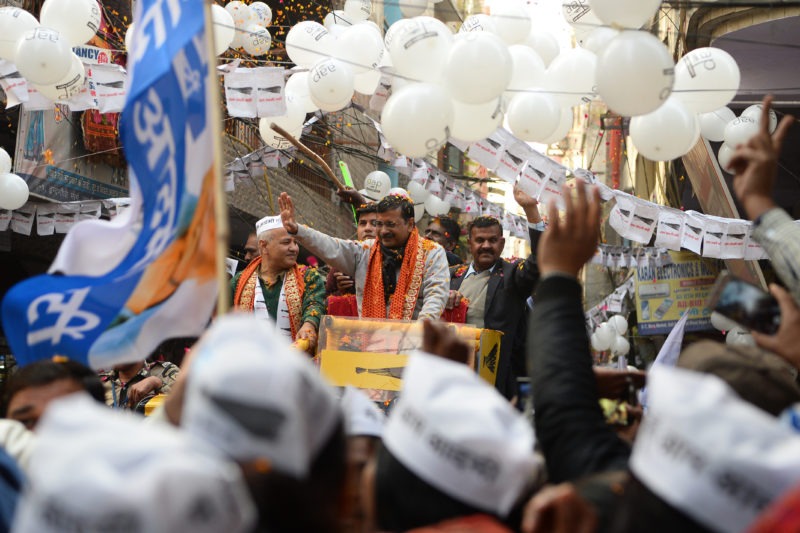Modi’s party seeks to unseat ‘common man’ in Delhi election
During the state election campaign, some members of the BJP have implied Delhi Chief Minister Arvind Kejriwal is a ‘terrorist’ (Sajjad HUSSAIN )
New Delhi (AFP) – A diminutive former tax inspector is in the cross-hairs of Indian Prime Minister Narendra Modi’s ruling party as it battles to take back power in Delhi state elections on Saturday.
Arvind Kejriwal, chief minister of the sprawling capital of 20 million since 2015, is standing for re-election — much to the chagrin of Modi’s Hindu nationalist Bharatiya Janata Party (BJP), which is reeling from protests and a faltering economy.
Despite being swept to a second term in national elections last year, the BJP has not run Delhi since 1998 and it has campaigned heavily to try and unseat Kejriwal, who has been giving Modi a run for his money in appealing to the city’s poor.
Many ordinary voters see Kejriwal, 51, a co-founder of the Common Man Party, as “one of them”, political strategist Amitabh Tiwari told AFP.
“He symbolises the power of the common man — that the common man can also contest and win elections.”
The stakes are high for the BJP after it lost control of Maharashtra state, whose capital is Mumbai, late last year.
Economic growth is its slowest in six years, unemployment is high, inflation is accelerating and India has seen weeks of at-times violent demonstrations over a new citizenship law.
The law, making it easier for non-Muslim persecuted minorities to become Indian, has stoked suspicion that Modi wants to turn officially secular India into a Hindu nation, something he denies.
A poor showing in the capital this weekend would be another blow to the party — and galvanise an opposition demoralised by last year’s national election defeat.
If Kejriwal wins, he will have “shown a way of beating Modi”, Mohan Guruswamy from the Centre for Policy Alternatives think-tank said.
“Geographically Delhi might not be big, but politically it is big. A defeat will be highly symbolic.”
Kejriwal’s popularity in Delhi’s teeming slums rivals that of Modi, 69, the son of a tea-seller who has carved out an image as a man of the people.
“Before Kejriwal came to power, most of our money went on electricity bills and we didn’t receive proper water supply,” said slum-dweller and mother-of-five Salatun, who survives on the meagre salary of her ragpicker husband.
“Now, both these problems have been solved. We hope that… Kejriwal comes back to power. It’ll be great for us.”
– Popular heroes –
Kejriwal and Modi have much in common.
Both swept away years of government by the grand old party of Indian politics, Congress, promising a new style free of corruption and the Nehru-Gandhi dynasty.
Their parties are mass movements centred on their personalities, both have been the subject of films, both have doled out freebies to voters — and promises from both have fallen short.
The difference though is that Modi’s politics also carry a heavy dose of “Hindutva” — hegemony for India’s majority Hindus — while Kejriwal’s do not, analysts say.
“The BJP is using its identity-based appeals, political polarisation to win elections,” political scientist Neelanjan Sircar from Ashoka University told AFP.
“The strategy is quite clear in that sense, but it’s a very dangerous game. These are not wounds that heal easily.”
Indeed in the Delhi election campaign the BJP’s tone has become ever shriller, with some members implying Kejriwal is a “terrorist” backing Muslim-majority arch enemy Pakistan.
The party also has sought to turn the election into a referendum on a women’s sit-in protest against the citizenship law that has snarled traffic for weeks.
The heightened rhetoric has sowed doubt in the poll outcome, with analysts saying it is not clear if voters will be drawn to the BJP’s dog whistling.
“That is what is going to be tested,” Guruswamy said.
“In the last five years… the economy has tanked and yet Prime Minister Modi has been re-elected, so he thinks that sloganeering will get them in.”
Disclaimer: Validity of the above story is for 7 Days from original date of publishing. Source: AFP.


